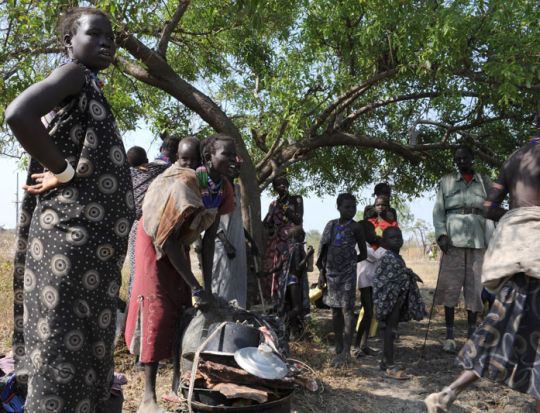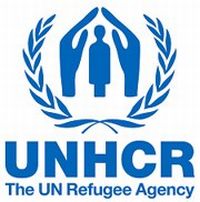Security Council presses for ethnic reconciliation in troubled area of South Sudan
Security Council presses for ethnic reconciliation in troubled area of South Sudan
 Internally displaced persons (IDPs) preparing a meal in South Sudan. Photo: UNMISS/Gideon Pibor
Internally displaced persons (IDPs) preparing a meal in South Sudan. Photo: UNMISS/Gideon Pibor
Security Council members have called on warring ethnic communities in South Sudan’s Jonglei state to engage in reconciliation and end the “cycle of conflict” that has claimed an unknown number of casualties in recent weeks.
In a press statement, issued yesterday by Ambassador Baso Sangqu of South Africa, which holds the Council presidency this month, the 15-member panel voiced deep concern at the situation in Jonglei.
“Violence in any form is unacceptable,” the statement stressed, calling on all communities in Jonglei to immediately “end the cycle of conflict and engage in a reconciliatory peace process.”
Deadly clashes between the Lou Nuer and Murle communities in recent weeks have displaced tens of thousands of civilians and led to United Nations agencies launching a major humanitarian operation to assist those in need.
Violence in any form is unacceptable.
Peacekeepers serving with the UN Mission in South Sudan (UNMISS) have also been deployed to the area to support the efforts of Government forces to restore peace and security, and daily air and land patrols have been stepped up to deter further attacks.
But Council members said they were concerned that UNMISS has a shortfall of operational helicopters, seriously affecting its ability to carry out its mandate in the newly independent country, and they urged Secretary-General Ban Ki-moon to continue his efforts to resolve this issue.
The statement also welcomed the efforts of the South Sudanese Government to protect civilians and mediate a solution to the crisis in Jonglei, and it urged authorities to continue their efforts to resolve the root causes of the recurring violence between the communities, which has often been linked to disputes over cattle and grazing land.
Council members voiced alarm about both the quantity and sophistication of the weaponry used in the most recent clashes, and they emphasized the need for greater security sector reform within South Sudan and for the disarmament, demobilization and reintegration of former rebel fighters across the impoverished country.
During a press briefing today, UN agencies on the ground warned about the worsening humanitarian situation and called on donors to increase their contributions. The Office for the Coordination of the Humanitarian Affairs (OCHA) said one of the main concerns was accessing areas in need of assistance, as they can only be reached by air, making it significantly more expensive to deliver aid. OCHA also highlighted its response plan, which is currently being finalized, to ensure the emergency needs of 60,000 affected people are met.
For its part, the Office of the UN High Commissioner for Refugees (UNHCR) warned that without international help, it would not be possible to respond to the multiple crises taking place in the country. In particular, the situation of 28,000 refugees in Doro camp in the Mabaan region was described as precarious, with the majority of refugees being exhausted, hungry and vulnerable.
In addition, UNHCR spokesperson Andrej Mahecic said the recent fighting in Sudan’s Southern Kordofan and Blue Nile states has forced more than 80,000 refugees to flee across the border into Unity and Upper Nile states in South Sudan, adding to the thousands of refugees already in need of assistance in the country.
Mr. Mahecic said UNHCR would continue to deliver assistance and highlighted the agency’s massive humanitarian airlift that began at the end of last month, which flew in some 280 tons of aid into the Malakal and Mabaan regions, benefiting 50,000 refugees.
###
About the United Nations Office for the Coordination of Humanitarian Affairs (OCHA)
OCHA is the part of the United Nations Secretariat responsible for bringing together humanitarian actors to ensure a coherent response to emergencies. OCHA also ensures there is a framework within which each actor can contribute to the overall response effort.
OCHA’s mission is to:
- Mobilize and coordinate effective and principled humanitarian action in partnership with national and international actors in order to alleviate human suffering in disasters and emergencies.
- Advocate the rights of people in need.
- Promote preparedness and prevention.
- Facilitate sustainable solutions.
How we deliver
OCHA’s Strategic Framework ensures that OCHA delivers on its core mandate, while responding to contemporary global challenges. The three pillars of the Strategic Framework are:
1. Partnerships: broadening the coalition for multilateral humanitarian action
The scale and scope of global challenges requires working together in new ways, with new partners. Partnership has always been integral to OCHA’s efforts. Sustained relations, built on trust and mutual respect, are vital when preparing for and responding to humanitarian emergencies. OCHA has a unique position within the international humanitarian system to convene and influence agendas. We will do this more strategically, with the aim of creating a more enabling environment for humanitarian action.
2. Service provider: building a better system
The expectations of OCHA have evolved since humanitarian reform. We will ensure that our services and support to partners also evolve and meet clients’ needs. We are focused on helping partners more predictably through humanitarian coordination leadership, strengthening coordination mechanisms, and improving the evidence base for humanitarian decision-making, planning and resource allocation.
3. Reliability and professionalism: creating better staffing and surge solutions to be there when it counts
In 2010, OCHA will introduce surge solutions to ensure the right people are on the ground immediately after a new disaster. This will be coordinated with longer-term staffing to ensure continuity of OCHA presence.
OCHA people
OCHA is its people. From 35 offices around the world, some 1,900 specialized and dedicated OCHA staff work to ensure that effective assistance reaches millions of humanitarian beneficiaries in four continents.

###
About the Office of the United Nations High Commissioner for Refugees (UNHCR)

The Office of the United Nations High Commissioner for Refugees was established on December 14, 1950 by the United Nations General Assembly. The agency is mandated to lead and co-ordinate international action to protect refugees and resolve refugee problems worldwide. Its primary purpose is to safeguard the rights and well-being of refugees. It strives to ensure that everyone can exercise the right to seek asylum and find safe refuge in another State, with the option to return home voluntarily, integrate locally or to resettle in a third country. It also has a mandate to help stateless people.
In more than six decades, the agency has helped tens of millions of people restart their lives.
Today, a staff of some 7,685 people in more than 125 countries continues to help some 33.9 million persons.
###
> United Nations (UN).
 The United Nations was established on 24 October 1945 by 51 countries committed to preserving peace through international cooperation and collective security. Today, nearly every nation in the world belongs to the UN: membership totals 192 countries.
The United Nations was established on 24 October 1945 by 51 countries committed to preserving peace through international cooperation and collective security. Today, nearly every nation in the world belongs to the UN: membership totals 192 countries.
When States become Members of the United Nations, they agree to accept the obligations of the UN Charter, an international treaty that sets out basic principles of international relations. According to the Charter, the UN has four purposes:
- to maintain international peace and security;
- to develop friendly relations among nations;
- to cooperate in solving international problems and in promoting respect for human rights;
- and to be a centre for harmonizing the actions of nations.
###
* The above story is adapted from materials provided by United Nations (UN)
** More information at United Nations (UN)




















